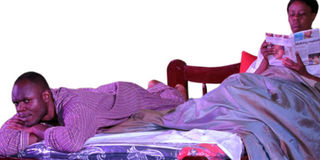World theatre visits Uganda again

Tonny Muwangala (L) and Eron Batwezera in a scene in the play Marriage Chronicles. Photo by Michael Kakumirizi.
From across West Africa in Senegal to the eastern border in Kenya, further east across the Indian Ocean and the Atlantic in Kosovo and Iraq/Belgium, Uganda experienced a four-day extravaganza of theatrical performance.
The Uganda National Cultural Centre (National Theatre) was yet again a chain of multi-cultural theatre during the second Kampala International Theatre Festival (KITF) organised by Bayimba Cultural Foundation last weekend.
Some plays were staged in the big hut or the green room, while others were showed in the auditorium.
Despite intent to select plays which had a closely-related pattern in the scripts to create a unified message experience for the audience, each came with unique variety.
While We Won’t Forget lasted about an hour, written and read by a young breed of four Kenyan university students (all below 25) staging a resilient youth, ready to speak against faults of trial wars, conflict and terrorism, Body Revolution (Iraq/Belgium), with only a few words for dialogue in 20 minutes, married visual communication impeccably.
The trio of actors played about with lighting and a picturesque background, casting images on white sheets, adding movement in theatre.
Even as the Kenyans contemplated the state of their nation (tracing the 1980’s massacre, to Kenya’s 2007/8 post-election violence, West Gate and Garisa terror attacks to Mpeketoni in Lamu) Uganda’s The Betrothal, written by Joshua Mmali, dissected the faults of Uganda’s civil servants. It ransacked the health sector, corruption and misuse of resources that would save the health sector of our country.
Artistic exchange
The plays ended with dialogue between the artists and the audience to relate their points of view.
Sitawa Namwali, who read Black Maria at last year’s KITF, said it is different sitting among the audience and watching your work.
“There were scenes that shocked me too, especially when Mugambi Nthiga and Nick Ndenda (acting as gods), seemed possessed,” she said with reference to Room of Lost Names.
There was conversation with Senegalese artist Patricia Gomis, whose work Moi, Monsieur et Moi kick, started the festival.
Other discussions, Focus on Theatre and Critiquing Theatre with Journalists, shade more light on what ought to be done to improve theatre in Uganda.
Among the greatest challenges was the low turn up. While thousands flocked different locations to see the Pope, seats in the auditorium remained blank, yet “theatre is as effective or even greater than religion at changing humanity, mindset and behaviour,” said actress Dolly Mukasa.
In as far as the art, technique and delivery is concerned, Ugandans had a leaf to pick from the creative endeavors of visiting performers. The festival showcased different ways of experimenting with theatre, offering alternative storyboards and setting what can be incorporated in our works.
SOME PRODUCTIONS
Marriage Chronicles (Uganda). The work of actor, dancer and playwright Samuel Tebandeke, chronicles the story of Margarette (Eron Batwezera), bent on having her own children, despite her husband, John (Tonny Muwangala)’s long term impotence. This variation from what society often conceives as the fault of the woman is the niche of this story.
Room Of Lost Names (Kenya). A 25-year-old girl, fresh after her Masters in Economics, is murdered by a grotesque rich man, Ben, when her cousin takes her to the club to meet the hub of wealthy men who “run Nairobi”.
This adaptation from a real life story of one religious, innocent girl, Mercy, shows human cruelty and hypocrisy when on her burial, she is branded a covet whore and drunkard, ruining her good name. It is both a satire and mockery of human kind.
Waiting For Train (Kosovo). This silent theatrical drama depicts two strangers stranded by the train station and fail to catch after in more than four attempts.
They meet, one too picky, extremely clean that he dusts about everything before he uses it, while the other is carefree, rather akin to music and mindless of where he sits and sleeps. How these two worlds apart eventually strike a friendship before death in the winter, is the essence of the play.




